In Focus
- UNHCR Eligibility Guidelines for Assessing the International Protection Needs of Asylum-Seekers from Honduras, 27 July 2016
On 27 July 2016, UNHCR released a new set of Eligibility Guidelines for assessing the international protection needs of asylum-seekers from Honduras.
These guidelines apply UNHCR's March 2010 UNHCR's Guidance Note on Refugee Claims Relating to Victims of Organized Gangs to the situation in Honduras.
- UNHCR Position on Returns to Southern and Central Somalia (Update I), 20 May 2016
On 20 May 2016, UNHCR released an Update to the Position on Returns to Southern and Central Somalia.
This paper supersedes UNHCR's June 2014 Position on Returns to Southern and Central Somalia.
- UNHCR Eligibility Guidelines for Assessing the International Protection Needs of Asylum-Seekers from Afghanistan, 19 April 2016
On 19 April 2016, UNHCR released a new set of Eligibility Guidelines for assessing the international protection needs of asylum-seekers from Afghanistan. They replace the August 2013 Afghanistan Eligibility Guidelines.
- Quality Assurance in RSD Special Feature Page, 15 March 2016
As part of the Special Feature on RSD in Refworld, a dedicated page on Quality Assurance has been created.
This new page on quality assurance in Refugee Status Determination is a central resource for all publicly available quality assurance project reports that UNHCR has been involved in. It also contains some practical tools developed in the context of UNHCR quality assurance projects.
- UNHCR Eligibility Guidelines for Assessing the International Protection Needs of Asylum-Seekers from El Salvador, 15 March 2016
On 15 March 2016, UNHCR released a new set of Eligibility Guidelines for assessing the international protection needs of asylum-seekers from El Salvador.
- International Protection Considerations with regard to people fleeing the Syrian Arab Republic, Update IV, 27 November 2015
On 27 November 2015, UNHCR released an Update to the International Protection Considerations with regard to people fleeing the Syrian Arab Republic (Update IV).
This paper supersedes UNHCR's October 2014 International Protection Considerations with regard to people fleeing the Syrian Arab Republic, Update III.
- UNHCR Position on Returns to Libya - Update I, 25 September 2015
In October 2015, UNHCR released an Update to the Position on Returns to Libya.
This paper supersedes UNHCR's November 2014 Position on Returns to Libya.
- International Protection Considerations Related to the Developments in Ukraine – Update III, 24 September 2015
On 24 September 2015, UNHCR released an Update to the International Protection Considerations related to developments in Ukraine.
This paper supersedes UNHCR's January 2015 International Protection Considerations Related to the Developments in Ukraine - Update II.
- UNHCR Eligibility Guidelines for Assessing the International Protection Needs of Asylum-Seekers from Colombia, 22 September 2015
On 22 September 2015, UNHCR released a new set of Eligibility Guidelines for assessing the international protection needs of asylum-seekers from Colombia. They replace the May 2010 Colombia Eligibility Guidelines.
- The former Yugoslav Republic of Macedonia As a Country of Asylum, 14 August 2015
Observations on the situation of asylum-seekers and refugees in the former Yugoslav Republic of Macedonia
- I Am Here, I Belong: The Urgent Need to End Childhood Statelessness, 01 August 2015
On the 1st anniversary of the #IBelong Campaign to End Statelessness, UNCHR launches a new report on the devastating impact of childhood statelessness, based on the testimonies of more than 200 stateless children and youth around the world.
- Guidelines on International Protection No. 11: Prima Facie Recognition of Refugee Status, 24 June 2015
These Guidelines set out the legal basis as well as procedural and evidentiary aspects of applying a prima facie approach
- UNHCR Manual on the Case Law of the European Regional Courts, 04 June 2015
A concise and comprehensive thematic guide to the case law of the European Court of Human Rights (ECtHR) and of the Court of Justice of the European Union (CJEU) that is of relevance to refugees, asylum-seekers and stateless persons.
- Summary of Deliberations on Credibility Assessment in Asylum Procedures, Expert Roundtable, 14-15 January 2015, Budapest, Hungary, 08 May 2015
Expert Roundtable on Credibility Assessment in Asylum Procedures in Budapest, Hungary on 14-15 January 2015, convened by UNHCR and organized with the Hungarian Helsinki Committee (HHC) as part of the "CREDO" projects.
- UNHCR Position on Returns to South Sudan - Update I, 14 April 2015
On 14 April 2015, UNHCR released an Update to Position on Returns to South Sudan.
This paper supersedes UNHCR's February 2014 UNHCR Position on Returns to South Sudan.
- UNHCR Position on Returns to Yemen, 09 April 2015
On 9 April 2015, UNHCR released a Position on Returns to Yemen, in which it urges States not to forcibly return any civilians to Yemen until tangible improvements in the security and human rights situation have occurred.
- International Protection Considerations Related to Developments in Ukraine – Update II, 28 January 2015
On 27 January 2015, UNHCR released an Update to the International Protection Considerations related to developments in Ukraine.
This paper supersedes UNHCR's July 2014 International Protection Considerations related to developments in Ukraine - Update I.
- UNHCR Position on Returns to Libya, 12 November 2014
On 12 November 2014, UNHCR released a Position on Returns to Libya, in which it urges States not to forcibly return persons originating from Libya until tangible improvements in the security and human rights situation have occurred.
- UNHCR Position on Returns to Iraq, 27 October 2014
On 27 October 2014, UNHCR released a Position on Returns to Iraq, in which it urges States not to forcibly return persons originating from Iraq until tangible improvements in the security and human rights situation have occurred.
- International Protection Considerations with regard to people fleeing northeastern Nigeria (the states of Borno, Yobe and Adamawa) and surrounding region – Update I, 27 October 2014
On 27 October 2014, UNHCR released an Update of its International Protection Considerations with regard to people fleeing northeastern Nigeria (the states of Borno, Yobe and Adamawa) and surrounding region.
This paper supersedes UNHCR's October 2013 International Protection Considerations with regard to people fleeing northeastern Nigeria (the states of Borno, Yobe and Adamawa).
- UNHCR observations on the current asylum system in Greece, 26 October 2014
This paper assesses the current asylum system in Greece and notes developments in particular since the last publication of UNHCR's Observations on the current situation of asylum in Greece and the M.S.S. v. Belgium and Greece judgment.
- UNHCR position on returns to North Kivu, South Kivu and adjacent areas in the Democratic Republic of Congo affected by on-going conflict and violence in the region - Update I, 15 September 2014
On 9 Septemebr 2014, UNHCR released an Update to the position on Returns to North Kivu, South Kivu and adjacent areas in the Democratic Republic of Congo affected by on-going conflict and violence in the region – Update I.
This paper supersedes UNHCR's November 2012 UNHCR position on returns to North Kivu, South Kivu and adjacent areas in the Democratic Republic of Congo affected by on-going conflict and violence in the region.
- International Protection Considerations Related to the Developments in Ukraine – Update I, 01 July 2014
On 1 July 2014, UNHCR released an Update to the International Protection Considerations related to developments in Ukraine.
This paper supersedes UNHCR's March 2014 International Protection Considerations related to developments in Ukraine.
- UNHCR Position on Returns to Southern and Central Somalia, 17 June 2014
On 17 June, UNHCR released a position on returns to Southern and Central Somalia. UNHCR calls for a suspension of forcible returns to the country. The organization considers that for many Somalis from these areas, eligibility for international refugee protection under the 1951 Convention, and in the African Union, under the 1969 OAU Convention should be considered; many of them are likely to meet the criteria for refugee status under one or both of these Conventions.
- Darfur: COI Compilation, 16 June 2014
This report by the Austrian Centre for Country of Origin and Asylum Research and Documentation (ACCORD), commissioned by UNHCR, provides Country of Origin Information (COI) pertaining to the security situation, political situation, human rights issues and the rule of law in the Darfur region of western Sudan. Topics covered include freedom of expression, freedom of assembly and association, actors involved in the conflict, political groups, ethnicity, women, LGBTI individuals, internally displaced persons and returnees. The report covers events up to 22 July 2014.
- Nationality and Statelessness: Handbook for Parliamentarians, 15 June 2014
In July 2014 the Inter Parliamentary Union and UNHCR published the second edition of Nationality and Statelessness: Handbook for Parliamentarians. This important advocacy and learning tool has been updated to provide information on contemporary statelessness issues, developments in international law and doctrine, good practice examples, and possible solutions. It recommends actions that can be taken by parliamentarians, government officials, international and civil society organisations and others to address the challenges of statelessness.
- International Protection Considerations with Regard to people fleeing Southern and Central Somalia, 16 January 2014
The UNHCR Protection Considerations contain information about recent and current developments which impact the assessment of international protection needs for persons from Southern and Central Somalia falling within certain risk profiles or finding themselves in certain circumstances.
This document serves as an interim update of the Eligibility Guidelines for assessing the international protection needs of asylum-seekers from Somalia, issued on 5 May 2010.
- China: COI Compilation , 15 January 2014
This report by the Austrian Centre for Country of Origin and Asylum Research and Documentation (ACCORD), commissioned by UNHCR, provides Country of Origin Information (COI) pertaining to political developments, the security situation, human rights issues and the rule of law in China. Topics covered include freedom of expression, freedom of religion, political opposition groups, ethnicity, women, LGBTI individuals and children. The report covers events up to 14 March 2014.
- International Protection Considerations related to developments in Ukraine, 11 January 2014
On 5 March 2014, UNHCR released International Protection Considerations related to developments in Ukraine. The paper contains guidance relevant to the determination of international protection needs of people who have left or may leave Ukraine (Ukrainian nationals, habitual residents of Ukraine, or third country nationals).
- UNHCR Position on Returns to South Sudan, 10 January 2014
On 11 January, UNHCR released a position on returns to South Sudan. UNHCR calls for a suspension of forcible returns to the country. The organization considers that many persons fleeing South Sudan are likely to meet the criteria for refugee status under the 1951 Refugee Convention, or would otherwise meet the refugee definition in Article 1(2) of the 1969 OAU Convention.
- UNHCR Protection Manual , 10 January 2014
The Protection Manual is UNHCR's repository of protection policy and guidance. It is organized by theme (see table of contents on landing page) and updated whenever a new protection policy or guidance document is published. The Protection Manual can be relied upon to represent the latest UNHCR protection policy / guidance.
- UNHCR observations on the current asylum system in Bulgaria, 02 January 2014
This paper assesses the prevailing reception conditions and asylum procedures in Bulgaria, including the situation for people transferred to Bulgaria under the Dublin Regulation. It identifies areas where the Bulgarian authorities are required to take urgent steps to effect improvements, in order to ensure respect for the rights of asylum-seekers and people in need of international protection.
- International Protection Considerations with regard to people fleeing northeastern Nigeria (the states of Borno, Yobe and Adamawa), 21 October 2013
On 29 October 2013, UNHCR released the International Protection Considerations with regard to people fleeing northeastern Nigeria (the states of Borno, Yobe and Adamawa).
- UNHCR launches new online database with human rights and refugee information in Russian, 21 October 2013
The availability and accessibility of relevant information in Russian, in one central database has the potential to contribute to better quality asylum decisions in all countries where Russian is used as a first language or is otherwise generally spoken and understood. Asylum-seekers who apply for international protection in Russian-speaking countries are therefore the ultimate beneficiaries of this project.
- Guidelines on International Protection No. 10: Claims to Refugee Status related to Military Service within the context of Article 1A (2) of the 1951 Convention and/or the 1967 Protocol relating to the Status of Refugees, 30 September 2013
The Guidelines examine the position of individuals who seek international protection to avoid military service either by State armed forces or non-State armed groups. - UNHCR Recommendations on Important Aspects of Refugee Protection in Italy, 10 September 2013
This UNHCR paper covers key aspects of the asylum situation and refugee protection in Italy, including access to territory and non-refoulement, protection of unaccompanied or separated children, access to the asylum procedure, quality of the asylum procedure, reception conditions for asylum seekers, and local integration. This paper is an update of the UNHCR Recommendations on Important Aspects of Refugee Protection in Italy, July 2012
- Iran: COI Compilation , 09 September 2013
This report by the Austrian Centre for Country of Origin and Asylum Research and Documentation (ACCORD), commissioned by the UNHCR, provides Country of Origin Information (COI) pertaining to political developments, the security situation, human rights issues and the rule of law in Iran. Topics covered include freedom of expression, freedom of religion, political opposition groups, ethnicity, women, LGBTI individuals and children. The report covers events up to 30 August 2013.
- UNHCR Eligibility Guidelines for Assessing the International Protection Needs of Asylum-Seekers from Afghanistan, 06 August 2013
On 6 August 2013, UNHCR released a new set of Eligibility Guidelines for assessing the international protection needs of asylum-seekers from Afghanistan. They replace the December 2010 Afghanistan Eligibility Guidelines.
- Ukraine as a country of asylum. Observations on the situation of asylum-seekers and refugees in Ukraine., 26 July 2013
This UNHCR paper provides an assessment of the Ukrainian asylum system, including access to procedures, quality of the asylum adjudication mechanisms, and treatment of unaccompanied children, as well as reception, accommodation and detention issues.
- Freedom of the Press 2013: Middle East Volatility amid Global Decline, 24 July 2013
This annual survey published by Freedom House assesses global media freedom. The percentage of the world's population living in societies with a completely free press has reportedly fallen to its lowest level in over a decade. According to the report, the world's worst-rated countries are Belarus, Cuba, Equatorial Guinea, Eritrea, Iran, North Korea, Turkmenistan, and Uzbekistan.
To access the country specific reports, go to Freedom House, Freedom of the Press 2013
- Asylum Research Consultancy Libya Country Report, 05 July 2013
This country report by the Asylum Research Consultancy (ARC) was commissioned by the UNHCR. It provides country of origin information (COI) on Libya on topics such as main political developments, the security situation, human rights issues and the rule of law. The report is intended to be used as a tool to help identify relevant COI for use in refugee status determination procedures. The report covers COI up to 5 July 2013.
- CORI Country Report Democratic Republic of Congo, 01 July 2013
This report by the Country of Origin Research and Information (CORI), commissioned by the UNHCR, provides Country of Origin Information (COI) pertaining to human rights issues in the DRC. Topics covered include freedom of expression, freedom of religion, ethnicity, and women and children. The report covers events up to 10 April 2013.
The report on the security situation in DRC is available here:CORI Country Report Democratic Republic of Congo; Security Issues.
- UNHCR Global Trends 2012: Displacement, The New 21st Century Challenge, 19 June 2013
This UNHCR report provides a review of trends in 2012. An estimated 7.6 million people were newly displaced due to conflict or persecution, including 1.1 million new refugees - the highest number of new arrivals in one year since 1999. Another 6.5 million people were newly displaced within the borders of their countries - the second highest figure of the past ten years. Furthermore, some 35.8 million persons were of concern to UNHCR by the end of 2012, the second highest number on record.
- Trafficking in Persons Report 2013, 19 June 2013
This annual report by the US Department of State provides a global look at the nature and scope of trafficking in persons and the broad range of actions by respective governments to confront and eliminate it. The report places each country onto one of three tiers based on the extent of their governments' efforts to comply with the "minimum standards for the elimination of trafficking" as set forth in US Law.
To access the country specific reports, go to Trafficking in Persons Report 2013
- "Beyond Proof – Credibility Assessment in EU Asylum Systems" – 2013, 14 June 2013
This UNHCR report provides unique insights into EU state practices in the complex and challenging area of credibility assessment in asylum claims, based on research in EU Member States, guidance from states beyond the EU, training materials, over 200 court rulings and 70 academic publications. The checklists and flowcharts annexed to the report translate the legal and theoretical concepts into practical tools to assist decision-makers and support a fair assessment of credibility.
- Amnesty International Annual Report 2013, 23 May 2013
This annual report by Amnesty International provides an assessment of the human rights situation in the world. The 2013 report focuses on human rights abuses faced by people who have escaped conflict and persecution, i.e. refugees, or migrated to seek work and a better life for themselves and their families, i.e. migrants.
To access the country specific reports, go to Amnesty International Annual Report 2013
- International Religious Freedom Report for 2012 , 20 May 2013
This annual publication by the US Department of State includes nearly 200 country/ territory specific reports which set forth the laws, policies, and practices of governments as well as the nature of societal respect for religious freedom in 2012.
To access the country specific reports, go to 2012 Report on International Religious Freedom
- Annual Review of the Human Rights Situation of Lesbian, Gay, Bisexual, Trans and Intersex People in Europe - 2013, 17 May 2013
This annual publication by ILGA - Europe provides a snapshot of events in 2012-at both the international and national levels, documents progress, and highlights key developments and trends regarding the human rights situation of LGBTI people. To access country specific reports, go to Annual Review of the Human Rights Situation of Lesbian, Gay, Bisexual, Trans and Intersex People - 2013
- Freedom in the World 2013: Democratic Breakthroughs in the Balance, 16 May 2013
This annual survey published by Freedom House provides a comparative assessment of global political rights and civil liberties in 195 countries and 14 related and disputed territories. The survey classifies countries as Free (43%), Partly Free (23%) and Not Free (34%).
To access the country specific reports, go to Freedom in the World - 2013
- Children and armed conflict : report of the Secretary-General, 15 May 2013
The annual Secretary-General's report on Children and Armed Conflict, covering the period January - December 2012, describes the impact of armed conflict on children around the world, with specific detail on the situation of children in a number of countries: Afghanistan, Central African Republic, Chad, Côte d'Ivoire, Democratic Republic of Congo, Iraq, Lebanon, Libya, the countries where the Lord's Resistance Army is active, Mali, Myanmar, The Occupied Palestinian Territory including East Jerusalem and Israel, Somalia, South Sudan, Sudan, Syrian Arabic Republic, Yemen, Colombia, India, Pakistan, Philippines and the Southern border provinces of Thailand.
- Freedom in the World 2002 - Cote d'Ivoire, 18 December 2001
-
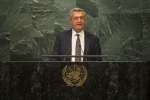 UN Summit commits to protect refugee, migrant rights
UN Summit commits to protect refugee, migrant rights
UN General Assembly Summit for Refugees and Migrants adopts key commitments to safeguard those on the move.
-
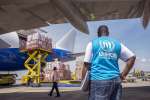 UNHCR airlifts aid to Uganda as thousands arrive from South Sudan
UNHCR airlifts aid to Uganda as thousands arrive from South Sudan
Thousands of refugees fleeing violence and human rights violations in South Sudan benefit from major aid operation.
-
 Refugees chief meets Pope Francis to discuss global displacement crisis
Refugees chief meets Pope Francis to discuss global displacement crisis
Filippo Grandi expressed deep appreciation for the Pope's advocacy and efforts to bring attention to refugees and internally displaced people.
-
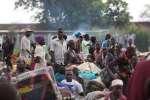 Refugees fleeing South Sudan pass one million mark
Refugees fleeing South Sudan pass one million mark
With this milestone, South Sudan joins Syria, Afghanistan and Somalia as countries which have produced more than a million refugees.
-
 UNHCR #WithRefugees petition heads to UN Secretary-General
UNHCR #WithRefugees petition heads to UN Secretary-General
With over 1.3 million signatures, the petition will be handed to UN Secretary-General Ban Ki-moon and General Assembly President Peter Thomson in New York.
-
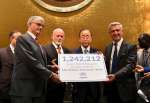 UN Secretary-General receives UNHCR #WithRefugees petition
UN Secretary-General receives UNHCR #WithRefugees petition
UNHCR chief hands #WithRefugees petition with more than 1.2 million signatures to UN Secretary-General Ban Ki-moon at the UN General Assembly in New York.
-
 Displaced three times, but retired Ukraine teacher stays upbeat
Displaced three times, but retired Ukraine teacher stays upbeat
Eighty-five-year-old Vira is among thousands of vulnerable elderly people snared in the conflict in eastern Ukraine, their lives turned upside down.
-
 Mobile connectivity a lifeline for refugees, report finds
Mobile connectivity a lifeline for refugees, report finds
New study by UNHCR and Accenture finds mobile phone and internet access is as critical to refugees' safety and security as food, shelter and water.
-
UNHCR Special Envoy urges action to solve Syria crisis
Angelina Jolie Pitt called on world leaders to find a solution to the Syrian conflict during visit to Syrian refugees in Jordan.
-
 Displaced Syrian swimmer makes a splash at 2016 Paralympic Games
Displaced Syrian swimmer makes a splash at 2016 Paralympic Games
While Ibrahim Al-Hussein did not make it through to the final of the 100 metre freestyle, competing at the 2016 Paralympic Games was a "dream come true."
-
 Cate Blanchett video highlights what refugees take when they flee
Cate Blanchett video highlights what refugees take when they flee
UNHCR Goodwill Ambassador heads top cast in exclusive Facebook film to promote UN Refugee Agency's #WithRefugees campaign.
-
 Displaced athletes make historic debut at Paralympic Games in Rio
Displaced athletes make historic debut at Paralympic Games in Rio
Ibrahim Al-Hussein leads Independent Paralympic Athletes Team into the Maracanã Stadium behind the flag of the International Paralympic Committee.
-
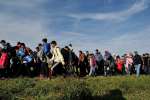 UN Summit seen as "game changer" for refugee and migrant protection
UN Summit seen as "game changer" for refugee and migrant protection
UN General Assembly September 19 Summit Addressing Large Movements of Refugees and Migrants is set to adopt key commitments to enhance protection.
-
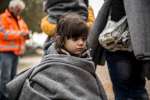 Since Alan Kurdi drowned, Mediterranean deaths have soared
Since Alan Kurdi drowned, Mediterranean deaths have soared
So far this year, the pace of drownings has only increased, setting 2016 on track to become the deadliest on record for those attempting to cross the Mediterranean.
-
 UNHCR chief pledges more support for Turkey refugee response
UNHCR chief pledges more support for Turkey refugee response
During visit to Ankara, Filippo Grandi says he will continue to advocate for more international backing, including increased funding and refugee resettlement.
